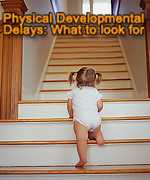Important Milestones: Your Child By Three Years
Milestone Checklist
How your child plays, learns, speaks, acts, and moves offers important clues about your child’s development. Developmental milestones are things most children can do by a certain age.
Check the milestones your child has reached by his or her 3rd birthday. Take this with you and talk with your child’s doctor at every visit about the milestones your child has reached and what to expect next.
What most children do by this age:
Social and Emotional
- Copies adults and friends
- Shows affection for friends without prompting
-
Takes turns in games
- Shows concern for crying friend
-
Understands the idea of “mine” and “his” or “hers”
- Shows a wide range of emotions
- Separates easily from mom and dad
- May get upset with major changes in routine

- Dresses and undresses self

Language/Communication
-
Follows instructions with 2 or 3 steps
-
Can name most familiar things
-
Understands words like “in,” “on,” and “under”
- Says first name, age, and sex

-
Names a friend
-
Says words like “I,” “me,” “we,” and “you” and some plurals (cars, dogs, cats)
-
Talks well enough for strangers to understand most of the time
-
Carries on a conversation using 2 to 3 sentences
Cognitive (learning, thinking, problem-solving)
- Can work toys with buttons, levers, and moving parts
- Plays make-believe with dolls, animals, and people
- Does puzzles with 3 or 4 pieces
-
Understands what “two” means
- Copies a circle with pencil or crayon
- Turns book pages one at a time
- Builds towers of more than 6 blocks
- Screws and unscrews jar lids or turns door handle
Movement/Physical Development
Act early by talking to your child’s doctor if your child:
- Falls down a lot or has trouble with stairs
- Drools or has very unclear speech
- Can’t work simple toys (such as peg boards, simple puzzles, turning handle)
- Doesn’t speak in sentences
- Doesn’t understand simple instructions
- Doesn’t play pretend or make-believe
- Doesn’t want to play with other children or with toys
- Doesn’t make eye contact
- Loses skills he once had
If You’re Concerned – Act Early
Tell your child’s doctor or nurse if you notice any of these signs of possible developmental delay for this age, and talk with someone in your community who is familiar with services for young children in your area, such as your state’s public early intervention program. For more information, visit our "If You’re Concerned" web page or call 1-800-CDC-INFO.
The American Academy of Pediatrics recommends that children be screened for general development using standardized, validated tools at 9, 18, and 24 or 30 months and for autism at 18 and 24 months or whenever a parent or provider has a concern. Ask your child’s doctor about your child’s developmental screening.
“Learn the signs. Act early.” materials are not a substitute for standardized, validated developmental screening tools.
Adapted from CARING FOR YOUR BABY AND YOUNG CHILD: BIRTH TO AGE 5, Fifth Edition, edited by Steven Shelov and Tanya Remer Altmann © 1991, 1993, 1998, 2004, 2009 by the American Academy of Pediatrics and BRIGHT FUTURES: GUIDELINES FOR HEALTH SUPERVISION OF INFANTS, CHILDREN, AND ADOLESCENTS, Third Edition, edited by Joseph Hagan, Jr., Judith S. Shaw, and Paula M. Duncan, 2008, Elk Grove Village, IL: American Academy of Pediatrics.
- Page last reviewed: August 16, 2016
- Page last updated: August 16, 2016
- Content source:



 ShareCompartir
ShareCompartir